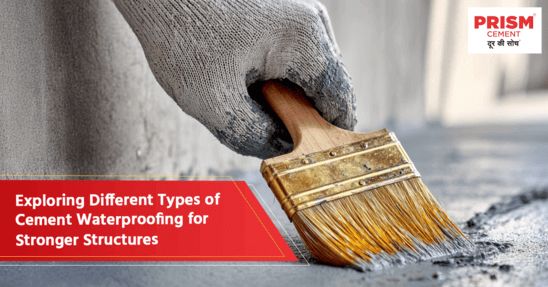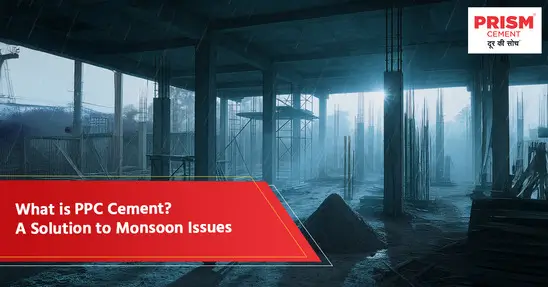Water damage can significantly compromise the structural integrity of buildings. Implementing effective waterproofing solutions is crucial for ensuring longevity and durability of the structure.
This blog explores the distinct types of cement used for waterproofing purposes, highlighting their applications and benefits.
Understanding Cement Waterproofing
Cement waterproofing is a process of applying a specific waterproofing material or method to avoid water penetration in concrete or cement-based elements. The technique is applied for the protection of foundations, roofs, walls and other locations that are subjected to moisture exposure. Cement waterproofing provides a water barrier, which reduces the chance of structural failure, mold formation, and corrosion.
Types of Cement Waterproofing
- Cementitious Waterproofing: In this process, a cementitious waterproofing coating is applied to the concrete surface. The coating usually contains a blend of cement, silica-based products and polymers, which create a tough barrier against water. It can be used for spaces such as basements, bathrooms and water tanks.
- Integral Waterproofing: In this method, waterproofing material is added to the concrete mix while batching. This provides consistent protection across the structure, which is best suited for foundations, retaining walls and other structural critical zones.
- Polymer-Modified Cementitious Waterproofing: It makes the cementitious coatings more flexible and adhesive with the use of polymers. It is used for applications with movement or thermal expansion, for example, waterproofing roofs and balconies.
- Crystalline Waterproofing: This process entails the use of a chemical treatment that will react with free lime and water in the concrete to create insoluble crystals. The crystals permeate the pores and capillaries, thus stopping water from entering. It can be used on new or old concrete structures.
- Waterproof Plaster: This entails incorporating waterproofing additives into the basic waterproof plaster material. This is widely utilized in wall waterproofing products.
- Waterproofing Coating: These are usually liquid-applied membranes that create a protecting layer on the surface of cement-based structures. They possess excellent flexibility and durability.
Factors to Consider When Choosing Cement Waterproofing
- Structure Type: The needs of the structure, i.e., foundation, roof or walls, determine the waterproofing method.
- Environmental Factors: Exposure to water, chemicals and temperature variations requires a long-lasting and chemical-resistant waterproofing material.
- Budget: Consider the cost of materials and application, ensuring the selected method fits within the project budget.
- Method of Application: Certain methods are simpler to apply than others, and some require specialized equipment or skills.
- Long-Term Performance: Assess the durability and maintenance needs of the selected waterproofing system.
Cement Waterproofing Application Process
The application process depends on the method chosen. Typically, it consists of:
- Preparation of the Surface: Cleaning and making good any damaged concrete surface.
- Mixing: Adhering to the manufacturer's guidelines to prepare the waterproofing mixture.
- Application: The application of waterproofing material with brushes, rollers or spray equipment.
- Curing: Permitting the waterproofing layer to cure well for maximum performance.
Avoid the Following Common Mistakes
- Inadequate Surface Preparation: Inability to clean and prepare the surface could weaken the adhesion of the waterproofing material.
- Impermissible Mixing Ratios: Applying incorrect mixing ratios will have an impact on the performance and lifespan of the waterproofing coating.
- Inadequate Curing: Incorrect curing may result in premature failure of the waterproofing coating.
- Incorrect Product Selection: Failure to choose the right product for the intended application.
Conclusion
It is necessary to examine the distinct types of cement waterproofing techniques to build more resilient and robust structures. Through an understanding of the available options and weighing factors that matter, construction workers can effectively introduce waterproofing techniques that guard against water damage and ensure sustained performance. Prism Champion All Weather Cement offers reliable protection, helping construction workers implement effective waterproofing solutions.
FAQs
Q1. What are various types of cement waterproofing used in buildings?
Answer: Common forms are cementitious waterproofing, integral waterproofing, polymer-modified cementitious waterproofing, crystalline waterproofing, and waterproof plaster.
Q2. What is the most suitable type of cement waterproofing for home foundations and basements?
Answer: Integral waterproofing and cementitious waterproofing are usually most favored for home foundations and basements because they are long-lasting and effective.
Q3. In what ways does cement waterproofing extend the life of a building?
Answer: Cement waterproofing stops water from entering and this reduces the threat of damage to the structure, mold development and corrosion, hence increasing durability.
Q4. How does integral waterproofing differ from surface waterproofing?
Answer: Integral waterproofing consists of incorporating waterproofing material into the concrete mix, whereas surface waterproofing consists of coating the concrete surface.
Q5. Is cement waterproofing capable of preventing cracks and leakage in buildings?
Answer: Yes, cement waterproofing can prevent cracks and leakage by forming a water-repellent barrier against water penetration and clogging pores and capillaries of the concrete.




